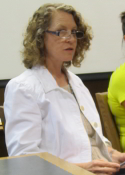- Campuses :
- Twin Cities
- Crookston
- Duluth
- Morris
- Rochester
- Other Locations

center for writing
mwp.umn.edu
Merry Davin
©2013
 Confluence I
Confluence I
She was never sure when he first appeared, or from where, only that one day he was just there. Walking with a girlfriend past the Dells Boat Company’s prime ticket selling booth, a voice hawking Upper Dells boat tours lured them in. It was the first of many occasions she would find herself there; find herself watching him, listening to the smooth-selling skill of a boy reeling the tourists in. By pairs or trios or entire extended families, he worked them as she would later watch him work clay into pots, coaxing them at just the right moments and with just the right pressure, to pay the price and ride the river. She watched and listened, unaware that she herself was seeping into a larger current against which she could not swim.
*******
Untitled
*******
The Wisconsin River flows from north to south until it turns westward at the Dells (dalles) to make its way—as all water must—to a larger body and, eventually, the sea. On a map it appears to nearly divide the state of Wisconsin in two, until it makes that directional turn to the right and ends up looking like a backward L.
As with all space on this continent, the river is steeped in history and memories of American Indians. Resident tribes fished these waters for food, borrowed water for cooking, bathed, played with their children. Rivers were the transcontinental rail and the interstate highway of their day—pack up the canoe, load the raft, follow the shoreline; we’re going to the sugar bush, summer camp, hunting grounds, the winter lodges. The Sauk chief Black Hawk fled into the Wisconsin territory with what was left of his band, supposedly hiding out in the narrows of the dalles before capture. Geologists studied and wrote of moraines and glaciers and sandstone; residents landmarked the riverbanks with descriptive nicknames; speculative businessmen came in, renamed them and found ways to capitalize on their natural presence to make money.
As a child growing up she did not know most of this. She wore her teal-colored Wisconsin Dells sweatshirt, matched with her six siblings in a rare photo, proud that her uncle owned four of the boats in the Upper Dells fleet, but somewhat puzzled to live all year in the place everyone else seemed to flock to only in the heat of summer. Along with the boat tours to cooling canyon stops, there were World War II Duck tours on amphibious watercraft, massive water slides at several theme parks, Tommy Bartlett’s Ski, Sky & Stage Show, and an indoor or outdoor swimming pool at most of the motels, hotels or campgrounds—including those that bordered a lake or a river! Into this aquatic environment, he and his family arrived in the summer of 1973.
He wasn’t the only non-local to suddenly appear as a freshman that autumn at WDHS, but it was easier to understand the presence of students riding buses in from Lake Delton. Typically they were of Ukrainian descent and their parents had benefited from investing in hotel/motel ownership. Since Delton didn’t have its own high school they attended the one in the Dells. In his case, neither of his parents had been born in the area, and so far as she knew, there weren’t any relatives in nearby towns (or anywhere else in Wisconsin for that matter). They came from a town west of Chicago. Maybe they had vacationed in the Dells area at one time or another and created that fantasy mantra some do when on vacation: “Wouldn’t it be great if we could live here all the time?” Perhaps his veterinarian father wanted a quieter practice than the one he left in Illinois. Or maybe his mother—an artist and antique dealer—read of a little store for sale on a farm property outside of town and convinced her husband and sons it was the ideal spot for all of them. A brother, older by a few years, would have been the least affected by a move to a forlorn farmhouse and its outbuildings, bounded by a river and by villages with names like Oxford, Big Spring and White Creek.
For the smooth talking ticket seller it must have been a shock to leave his town and friends behind on the eve of starting high school. She never knew why they had moved to the Dells, and she never would have insulted either them, or the town, by asking. But she always wondered. And in her pondering of that mystery, the essence of water virtually surrounding her went unnoticed. Rivers, eddies, creeks; the depths, the dam, the Dells—none of it registered at the time.
*******



